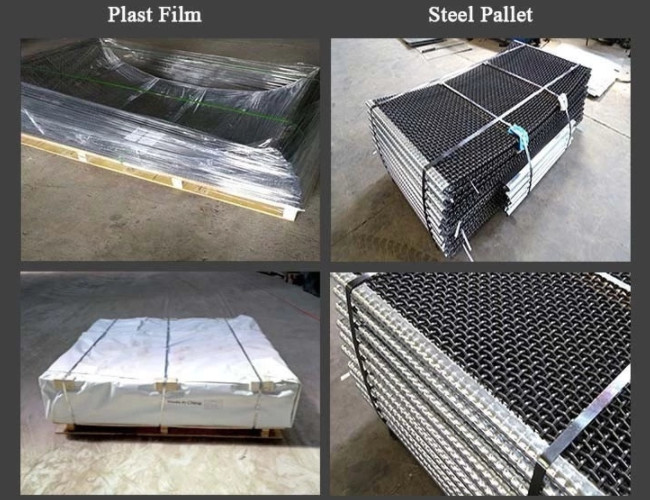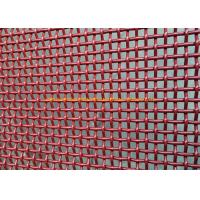Plain Weave Crimped Wire Mesh Stainless Steel Square Chemical Resistant
Crimped wire mesh is made in a similar fashion to woven fabrics, as
it is woven on looms. Wires are woven together to create wire mesh
in different patterns, such as plain weave and twilled weave. The
most common materials used to create woven wire mesh include carbon
steel, galvanized steel, aluminum mesh and stainless steel.
Stainless wire mesh is especially useful because it is extremely
chemical resistant, works with hot or cold liquids and is easily
cleaned. Meanwhile, aluminum mesh is lightweight, strong, has a
high electrical conductivity and a low melting point. It also
significantly resists atmospheric corrosion. Other materials such
as copper and nickel alloys are suitable to be woven into wire
mesh.
Heavier woven wires must be pre-crimped. The material remains
stable and rigid after the crimping process. Our pre-crimped woven
wire mesh is available in inter crimp, lock crimp, plain weave and
flat top woven styles, and it is ideal for architectural
applications.
Features of Crimped Wire Mesh:
Optimum bending strength
High abrasion resistance
Accurate dimensions
Excellent stability
Common Applications for Crimped Wire Mesh:
Mining industry
Coal factory
Construction industry
Food processing and meat industry
WOVEN WIRE CRIMPS
Conventional Double Crimp Woven Wire
Most common type of woven wire. It is used where the opening is
relatively small in comparison to the wire diameter.
Lock Crimp Woven Wire
This woven wire type is used only in coarse specifications to
maintain the accuracy of weave throughout screen life, where the
opening is large with respect to wire diameter.
Inter Crimp Woven Wire
Used in coarse weaves of lighter gauge woven wire to provide
greater stability, tightness of weave and maximum rigidity. Very
common in wire mesh openings larger than 1/2" (12.7mm).
Flat Top Woven Wire
Usually starts at 5/8" (15.875 mm) opening and larger. Provides
long abrasive resistant life, since there are no projections on top
to wear. Flat top woven wire offers the least resistance to flow
and is very popular in certain architectural and structural
applications where a smooth surface on one side is desirable.
WOVEN WIRE WEAVE STYLES
Plain Square Woven Wire
The most common weave, with the same diameter warp and shute wires
woven in a simple over and under pattern. It produces screens with
the same mesh count in both directions.
Twill Square Woven Wire
Each shute wire typically passes over two warp wires and under two,
producing square openings. Twill weave can be made from
larger-diameter wires than would be possible in plain square weave
to obtain greater strength, density or corrosion resistance.
Plain Dutch Woven Wire
Woven in a plain, over and under pattern. A thinner, smaller
diameter shute wire is used; these are driven very close together
creating a very tight weave. Dutch weaves do not have a
straight-through, clear opening as do most plain weave styles.
Instead the weave style creates a tortuous path through which very
fine filtration and particle retention can be achieved. Dutch
weaves may be specified by "mesh count" or "absolute filter
rating."
Dutch Twill Weave
Similar to Plain Dutch except woven in the Twill style. Each wire
passes over two wires then under two wires, still utilizing a
smaller-diameter shute wire, allowing an even tighter weave and
even finer filtration than Plain Dutch weave.
Reverse Dutch Weave
The same weave as Plain Dutch except the warp and shute wires are
reversed; I.e., the warp wires have a smaller diameter than the
shute wires. The larger shute wires are woven closer together than
would usually be seen in a Plain Dutch weave.
Rectangular or "Off-Count" Weave
A Plain weave wire cloth, woven in an over and under pattern with a
different number of wires in the warp and shute direction, which
yields a rectangular opening wire cloth. Rectangular openings are
often used in sifting and sizing operations to increase product
"through" capacity with minor sacrifices in accuracy. To reduce
material costs, off-count mesh may be substituted for square mesh
in some applications that do not require a high level of accuracy.
Some wire cloth vendors will substitute off-count wire cloth when
certifications are not specified by the manufacturer, e.g. A 90 x
100 mesh may be substituted for 100 x 100.
| Aperture mm | Aperture Tolerance mm | Wire mm | Edge Length mm | Weight kg/㎡ |
| | Minimum | Maximum | | Minimum | Maximum | |
| 101.60 | 98.55 | 104.65 | 12.70 | 12.70 | 50.80 | 17.92 |
| 88.90 | 86.23 | 91.57 | 12.70 | 12.70 | 44.45 | 20.16 |
| 76.20 | 73.91 | 78.49 | 12.70 | 12.70 | 38.10 | 23.04 |
| 63.50 | 61.60 | 65.41 | 12.70 | 12.70 | 31.75 | 26.88 |
| 63.50 | 61.60 | 65.41 | 9.19 | 9.19 | 31.75 | 14.76 |
| 57.15 | 55.44 | 58.86 | 9.19 | 9.19 | 28.58 | 16.17 |
| 50.80 | 49.28 | 52.32 | 12.70 | 12.70 | 25.40 | 32.26 |
| 50.80 | 49.28 | 52.32 | 11.10 | 11.10 | 25.40 | 25.28 |
| 50.80 | 49.28 | 52.32 | 9.19 | 11.10 | 25.40 | 17.88 |
| 50.80 | 49.28 | 52.32 | 7.92 | 7.92 | 25.40 | 13.57 |
| 44.45 | 43.12 | 45.78 | 9.19 | 9.19 | 22.23 | 20.00 |
| 44.45 | 43.12 | 45.78 | 7.92 | 7.92 | 22.23 | 15.21 |
| 41.28 | 40.04 | 42.51 | 9.19 | 9.19 | 20.64 | 21.25 |
| 41.28 | 40.04 | 42.51 | 7.92 | 7.92 | 20.64 | 16.19 |
| 38.10 | 36.69 | 39.24 | 9.19 | 9.19 | 19.05 | 22.68 |
| 38.10 | 36.69 | 39.24 | 7.92 | 7.92 | 19.05 | 17.31 |
| 38.10 | 36.69 | 39.24 | 7.19 | 7.19 | 19.05 | 14.49 |
| 31.75 | 30.80 | 32.70 | 9.19 | 9.19 | 15.88 | 26.20 |
| 31.75 | 30.80 | 32.70 | 7.92 | 7.92 | 15.88 | 20.08 |
| 31.75 | 30.80 | 32.70 | 7.19 | 7.19 | 15.88 | 16.85 |
| 28.58 | 27.72 | 29.43 | 7.92 | 7.92 | 14.29 | 21.83 |
| 28.58 | 27.72 | 29.43 | 7.19 | 7.19 | 14.29 | 18.35 |
| 25.40 | 24.64 | 26.16 | 7.92 | 7.92 | 12.70 | 23.91 |
| 25.40 | 24.64 | 26.16 | 7.19 | 7.19 | 12.70 | 20.14 |
| 19.05 | 18.48 | 19.62 | 5.72 | 5.72 | 9.53 | 16.78 |
| 15.88 | 15.40 | 16.35 | 4.50 | 4.50 | 7.94 | 12.62 |
| 11.00 | 10.67 | 11.33 | 4.00 | 4.00 | 5.50 | 13.55 |
| 10.00 | 9.70 | 10.03 | 4.00 | 4.00 | 5.00 | 14.51 |
| 8.00 | 7.76 | 8.24 | 4.00 | 4.00 | 4.00 | 16.93 |
| 6.35 | 6.16 | 6.54 | 2.67 | 2.67 | 3.18 | 10.04 |
| 6.30 | 6.11 | 6.49 | 2.50 | 2.50 | 3.15 | 9.93 |
| 4.00 | 3.88 | 4.12 | 2.00 | 2.00 | 2.00 | 9.31 |
| 3.00 | 2.91 | 3.09 | 2.00 | 2.00 | 2.00 | 11.17 |
| 2.00 | 1.94 | 2.06 | 1.50 | 1.50 | 1.50 | 8.99 |










